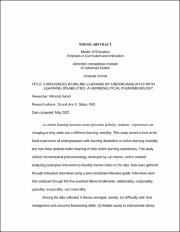Experiences in online learning by undergraduates with learning disabilities : a hermeneutical phenomenology
Abstract
As online learning becomes more prevalent globally, students’ experiences are changing as they settle into a different learning modality. This study aimed to look at the lived experiences of undergraduates with learning disabilities in online learning modality and how these students make meaning of their online learning experiences. This study utilized hermeneutical phenomenology developed by van Manen, which entailed analyzing participant interviews to develop themes based on the data. Data were gathered through individual interviews using a semi-structured interview guide. Interviews were then analyzed through the five essential lifeworld elements: relationality, corporeality, spatiality, temporality, and materiality.
Among the data collected, 6 themes emerged, namely: (a) difficulty with time management and executive functioning skills, (b) limited access to instructional clarity,
(c) advantages of synchronous and asynchronous lectures in online modality, (d) negative emotional experiences, (e) negative effects on academics, and (f) social impact on participants. While most of the themes found among participants’ experiences in this study were negative (except for Theme 3), and other literature has shown similar experiences among other studies, some other literature has shown differing results. More research still needs to be done on this topic. This study suggests ideas for further research and for teachers as they interact with their students who may have needs similar to the participants of this study.


